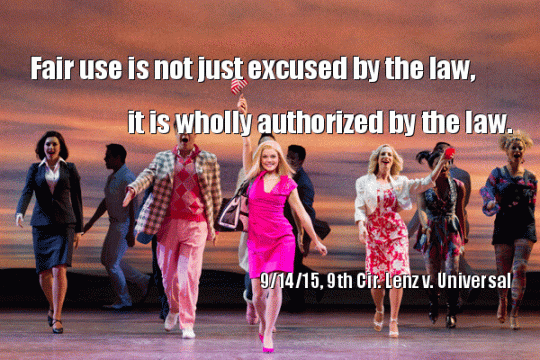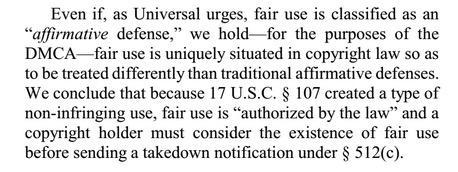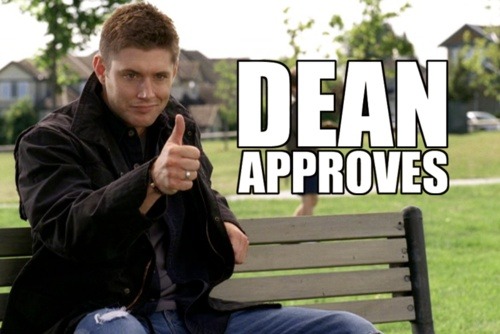Fair use is … wholly authorized by the law. That’s what the 9th Circuit said today, in a ruling that will become a terrific tool to support sharing of transformative works (like fanfic, fanart, cosplay, fanfilms, filks, etc.).
Back in 2001 and 2003, when I first started writing and speaking about fair use in connection with what we’re now calling “fan law”, we did a lot of argiing by analogy. Caselaw hadn’t really caught up with how people were actually using the internet and definitely hadn’t caught up with the idea that fans of a show or book or film or band or piece of art or work of creativity would create a “follow-on work” and share it at no cost to anyone, on the internet.
But lawyers argue by analogy – we go before a court and say “this is similar to that, and thus the laws for that should also apply to this”. That’s how it works (at least in the US) so it was reasonable to say because of court rulings in The Wind Done Gone and the 2 Live Crew case re Pretty Woman, or a 1996 case in the 11th Circuit that said “
fair use is not an infringement, that (noncommercially distributed) fanworks – as transformative works – were fair use and thus were not infringements of someone’s copyright.
By and large, over the last fifteen years (and actually, through the 90s too) the courts have agreed with this concept every time something that parallels an aspect of fanworks comes before an appellate court. Click the Fair Use tag here for examples.
However, today the 9th Circuit issued its ruling in Lenz v. Universal, a case that dates back EIGHT YEARS to a pre-Google time at YouTube, when the tv networks were all freaking out about this new way that people could get content via the internet, and the music companies were continuing their perpetual angst about the idea that certain uses of songs could be, in any way noninfringing.
While Lenz doesn’t really redefine large swaths of law, it makes a few points explicit and clear:
- Fair use is not just excused by the law, it is wholly authorized by the law.
- A copyright holder must consider the existence of fair use before sending a takedown notification.
- The DMCA requires consideration of fair use prior to sending a takedown notification…
- If a copyright holder ignores or neglects our unequivocal holding that it must consider fair use before sending a takedown notification, it is liable for damages.
- A copyright holder who pays lip service to the consideration of fair use by claiming it formed a good faith belief when there is evidence to the contrary is still subject to §512(f) liability.
The court also quoted a brief from transformativeworks (OTW/AO3) where we set forth when computer programs might be of use in finding infringements where “(1) the video track matches the video track of a copyrighted work submitted by a content owner; (2) the audio track matches the audio track of that same copyrighted work;and (3) nearly the entirety…is comprised of a single copyrighted work.” As you can see, that process wouldn’t be applicable for fanworks.
The ruling doesn’t mean an end to automatic takedown notices; where a file of concern matches exactly to a single copyrighted work *and* nearly the entirety of the file of concern is comprised of that single copyrighted work, bots and automated notices would still be viable.
But a video manifesting mashup culture or a story that’s a follow-on work or a meme that includes a copyrighted photo and text that comments on or criticizes something, or educational infographs should not be DMCA-ed by autobots, and any analysis by the copyright-holder of the fanfic, fanart, etc. they’re looking at must actually look to current law regarding whether something is a transformative work/fair use/otherwise noninfringing.
Does this mean that creative fans will suddenly start experiencing fewer DMCA takedowns? Possibly, but also maybe not. But it does mean that if a creative fan gets a DMCA takedown/notification about fanworks (especially when there’s no commercial sale) the fan can and should push back on whether the sender has actually considered fair use; if it’s obvious that they haven’t, the creative fan may be able to seek damages.
Perhaps that risk of damages will be a disincentive to copyright-holders, so they focus their attention, and DMCA notices, on works that are actual counterfeits – copies of entire movies, books or tv serieses, or high resolution copies of art.
Copyright holders cannot shirk their duty to consider—in good faith and prior to sending a takedown notification—whether allegedly infringing material constitutes fair use, a use which the DMCA plainly contemplates as authorized by the law.
And that’s a good thing.



